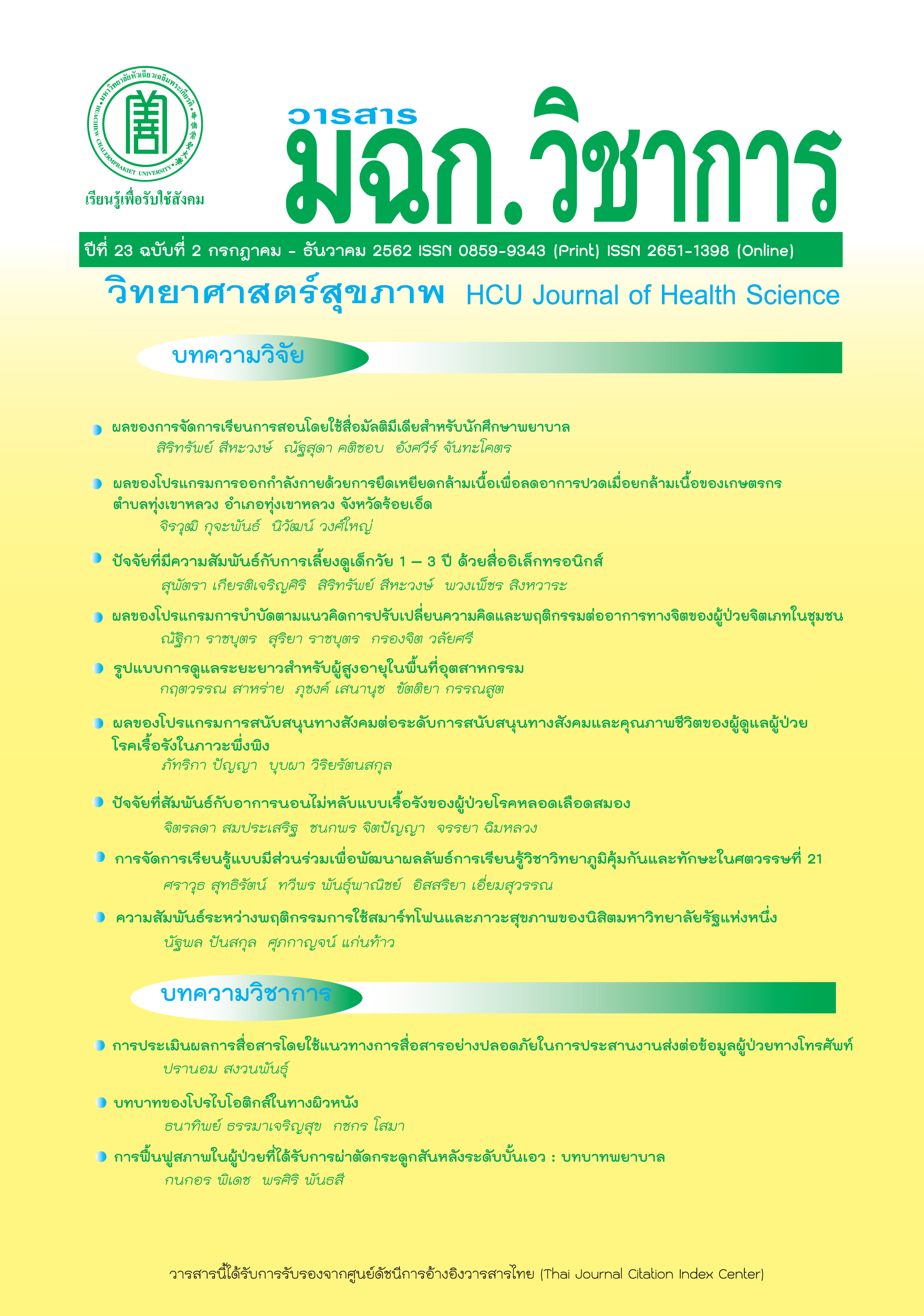Participatory Learning Management for Development of Immunology Learning Outcomes and 21st Century Skills
Keywords:
Participatory learning, Immunology 21st, century skillsAbstract
Participatory learning management was implemented for development of learning outcome and 21st century skills in immunology class of 140 third year medical technology students, Huachiew Chalermprakiet University. Students were already analysed individual learning styles and found that the most were participant and collaborative styles. Students designed learning management plan in humoral immune responses topic through dramatization that enhance development of learning outcomes of all five domains involve 21th century skills. Evaluation on students’ satisfaction was shown that the most students were satisfied participatory learning. Assessment of students’ knowledge of humoral immune responses after using participatory learning management was significantly higher learning achievement than the past two years statistically significance (p<0.05). However lecture-based learning still necessary for communicating conceptual knowledge while participatory learning process enhance desired personal characteristics, learning outcomes development and fulfill other sets of skills for effective and efficient learning and living in the 21st century.
Downloads
References
2. สำนักบริหารงานการมัธยมศึกษาตอนปลาย สพฐ. แนวทางจัดการเรียนรู้ในศตวรรษที่ 21 [อินเทอร์เน็ต]. 2561 [เข้าถึงเมื่อ 19 พย 2561]. เข้าถึงได้จาก: https://webs.rmutl.ac.th/assets/upload/files/2016/09/
20160908101755_51855.pdf
3. กรมสุขภาพจิต. คู่มือฝึกอบรมแบบมีส่วนร่วม. พิมพ์ครั้งที่ 4. กรุงเทพมหานคร: วงศ์กมลโปรดักชั่น; 2544.
4. สถาบันส่งเสริมการเรียนรู้เพื่อการพัฒนาที่ยั่งยืน. การจัดกระบวนการเรียนรู้แบบมีส่วนร่วม. เชียงใหม่: เชียงใหม่ บีเอสการพิมพ์; 2544.
5. Suttirat S, Phunpanich T, Horata N. Lesson learned from immunology teaching using learning from activity “Who am I in the immune system?”. J Med Tech Assoc Thailand. 2014;42(1):4852-61.
6. Suttirat S, Phunpanich T. Evaluation of role play in complement topic, basic immunology subject for Medical Technology students, HCU. J Med Tech Assoc Thailand. 2004;32(1):594-604.
7. Suttirat S, Phunpanich T. The activity to support basic immunology learning: student-centered learning model, HCU. J of Science and Tech. 2004;7(14):27-32.
8. Suttirat S, Phunpanich T, Horata N. The development of learning method in immunology using sarcastic debate. J Med Tech Assoc Thailand. 2012;40(3):4311-20.
9. กรมสามัญศึกษากระทรวงศึกษาธิการ. พระราชบัญญัติการศึกษาแห่งชาติ พ.ศ. 2542 และการวิเคราะห์สาระสำคัญ. กรุงเทพมหานคร: โรงพิมพ์คุรุสภาลาดพร้าว; 89. 2542.
10. Grasha A, Reichman S. Workshop handout on learning styles. Ohio: Faculty Resource, University of Cincinanati; 1975.
11. ชัยอนันต์ สมุทวณิช. เพลิน-plearn (เล่นเรียน) เพลิน. กรุงเทพมหานคร: พีเพรส; 2541.
12. Buckingham D, Scanlon M. Education, entertainment, and learning in the home. Buckingham/Philadelphia: Open University; 2003.
13. นพวรรณ ต่อแสงศรี. การบูรณาการสารคดีละครและสาระบันเทิงของบริษัททีวีบูรพาจำกัดสู่สื่อสิ่งพิมพ์.[วิทยานิพนธ์]. กรุงเทพมหานคร; จุฬาลงกรณ์มหาวิทยาลัย; 2553.
14. เทียมยศ ปะสาวะโน. เอดูเทนเมนต์: การศึกษาแนวใหม่ที่เน้นความบันเทิง. วารสารวไลอลงกรณ์ปริทัศน์ 2556;3(2):159-67.
15. สันติ บุญภิรมย์. การบริหารจัดการในห้องเรียน. กรุงเทพมหานคร: ทริปเพิ้ลเอ็ดดูเคชั่น; 2558.
16. ไพฑูรย์ สินลารัตน์. การศึกษา 4.0 เป็นยิ่งกว่าการศึกษา. กรุงเทพมหานคร: โรงพิมพ์จุฬาลงกรณ์มหาวิทยาลัย; 2559.
Downloads
Published
How to Cite
Issue
Section
License
บทความที่ได้รับการตีพิมพ์เป็นลิขสิทธิ์ของวารสารวิทยาศาสตร์สุขภาพและสุขภาวะ
ข้อความที่ปรากฏในบทความแต่ละเรื่องในวารสารวิชาการเล่มนี้เป็นความคิดเห็นส่วนตัวของผู้เขียนแต่ละท่านไม่เกี่ยวข้องกับมหาวิทยาลัยหัวเฉียวเฉลิมพระเกียรติ และคณาจารย์ท่านอื่นๆในมหาวิทยาลัยฯ แต่อย่างใด ความรับผิดชอบองค์ประกอบทั้งหมดของบทความแต่ละเรื่องเป็นของผู้เขียนแต่ละท่าน หากมีความผิดพลาดใดๆ ผู้เขียนแต่ละท่านจะรับผิดชอบบทความของตนเองแต่ผู้เดียว




